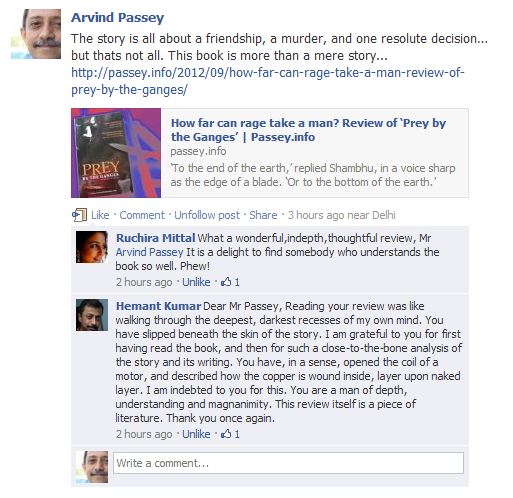How far can rage take a man? Review of ‘Prey by the Ganges’
by Arvind Passey on Sep 21, 2012 • 4:26 PM 2 Comments‘How far can rage take a man?’ asked Hariya.
‘To the end of the earth,’ replied Shambhu, in a voice sharp as the edge of a blade. ‘Or to the bottom of the earth.’
As I read these lines, I finished reading the second chapter and it was already becoming increasingly difficult to leave the book. This book is like an inquest into the darker side of man and there isn’t a single page where the pulse ceases to race and throb uncontrollably. I sat up the entire night to finish the nearly four hundred pages that the book has… reading and re-reading parts. Even today, days after having read the entire book, I am tempted to leave the review –writing and go back to the pages. Yes, this is one book I am surely going to keep coming back to.
The book takes us into ‘the forgotten, stagnant backwaters of independent India’, the heart of class distinctions and the crime that the rural and remote areas of eastern India had and probably still tolerates… but this story happens in the late forties. The story is all about a friendship, a murder, and one resolute decision… this combo meanders through life in the jungle, conditions of people in villages, lots of mindless killings, frustrations, fears, cunning, confrontations, and the strangest definition of sex ever! This surely could not have been an easy book to write… and would have demanded a high degree of involved subliminal processing. Hemant Kumar, the author does admit: Writing is my calling. But it took me fifty years of living and working and groping in the dark to realise that I was made for writing and writing alone.
The story begins with the murder of Ravi by ‘men on the opposite bank not even looking over their shoulders to see if anyone was watching them. It was as if they owned the night, unafraid, oblivious.’ We see Shambhu, who is Ravi’s friend and a Vaid, watching helplessly and then…
Shambhu had made up his mind.
He announced to Hariya that he was going to cross the river – with the money.
‘What?’ Hariya almost barked. ‘But you don’t know the first thing about Janak Ganj or the jungle, or anything. See what happened to your friend.’
Shambhu had decided and Hariya knew wild horses wouldn’t keep him away, danger or no danger.
‘I want answers,’ he snapped.
‘What will answers bring, or bring back?’
‘Closure,’ he replied, quiet, ready, resolute.
Thus we find Shambhu firmly resolving ‘to retrace Ravi’s footsteps, moment by moment, and then see for myself, where it went so horribly wrong. There isn’t a safe, secure way to do it. This danger has to be lived, even if it takes my life.’ And from here the book moves forward, equally resolutely, to seek insights into the lives of over-bearing humans, the raw intelligence of gunmen, and with chilling deliberateness, introduces us to characters like Thakur Suraj Singh, Thakur Gajanan Singh, Dhibri, Somwari, Laalten, Bhondu, Kariya, Baabu, and all the others who may appear for a short while but actually give vital clues to why everything is happening the way it is in these parts of our country.
Besides the gripping story, the plot, and all things dark, the author has a keen sense of observation and putting everything down in a rather vivid way. The well-worn stone steps on the Ghats next to the Ganga could hardly have had a better description:
Time had left its indelible stamp on the stone. Wet feet constantly dripped water into the well-filled depressions, leaving tiny pools of Ganga in each of them.
And if you’ve ever been on any of these river ghats and have seen the ganja-stuffed nomads who are happily immersed in their own interpretation of life and sit, smoke, sing, and move from one place to another… and this is how Hemant makes them tell us who they are:
‘We are bhaktas of Mother Ganges. We go wherever she takes us. We don’t live here,’ said the man. Shambhu nodded knowingly and he went on. ‘We don’t live anywhere. Just as the river doesn’t live anywhere, yet she is everywhere…’
The author describes in his own inimitable way his observations – pure physical observations – of what he sees as they sing oblivious of what goes around:
And when he shook his head in the middle of an excited crescendo, tiny droplets of sweat flew out like scintillating pieces of music, backlit by the brilliant winter sun.
It is vital to point out here that none of all this Dickensian talent is thrust in any page nor do they appear to disappear unconnected… all this romanticism is inextricably woven into the complex matrix of intrigue that oozes out ominously through every paragraph, connecting every moment and not one of them is dispensable. No description for description’s sake… no long-winding verbosity, even if it is found anywhere, is because the author just wanted to show us all that he has the ability to go about it. They are all there because the plot makes it essential for them to be there – in a chilling sort of way, if I may add.
Shambhu has entered the treacherous zones of this part of the country seeking answers – a friend seeking answers to appease the soul of his dead friend. He doesn’t let go of his quest that takes him tumbling right through a series of events that can be termed as nothing short of a chilling adventure. He doesn’t let go of his quest even when he is face-to-face with the wily and dangerous Gajanan inside his own house…
‘Answer my question.’
‘What question?’
‘Why did you kill him?’
‘You mean you’ve come this far, risking your life, taking that knife in your belly and sneaking into my house, just to ask me this question?’
‘You heard me,’ said Shambhu, unwavering.
The book takes us boldly into the interiors of treachery as well as human misery, inside fears as well as determination, and scoops up the crudeness and rawness of life as it exists when the law of the land mean no more than an amorphous lump of corruption! The writer, it appears, is quite like Gajanan who ‘wasn’t used to confusion, indecision or mixed feelings. He was intelligent, quick-thinking and resolute. He knew what he wanted in life and pursued it single-mindedly. Ruthlessly.’ As I read these lines, I could actually see the writer there telling us a little about himself… or was he giving us vital clues to the art of writing?
Frankly, this is one book that has innumerable little phrases and sentences and paragraphs that I wish I could learn by heart as I did when I sat for my ISCE examination and knew the entire text of ‘Great Expectations’ by heart! Chilling words pop up unexpectedly at you from all the directions at all times and this can actually unnerve a reader who is unprepared. So be ready to enter a world where you’ll soon be able to ‘sniff a thief, a liar or a con in a crowd.’ They gravitate to you and bare themselves in a most gory way but that is the only way they know… almost like Baabu’s notorious bayonet that ‘completely transformed from a soldier’s survival tool into a mean looking murder weapon. Menacing.’
Yes, you realise as a reader that even lighted corners and celebrations in the novel have dark edges looming at you, crouching and waiting to pounce when you least expect them to. They do… even sex sounds so scary that it gives you more goose-bumps than the doses of titillation that you may look for. Here is Bhuteri warning her daughter Etwari about what to expect when Gajanan is upon her:
‘He has a bull’s body and a horse’s stamina,’ she explained to Etwari. ‘Worse, he has a spider’s mind. He’ll let you jump and burn yourself out, before eating the brain out of your head. And just when you think it is all over now, and you’ve done everything you could, he knocks the earth from under your feet. Be on your guard and let him feel you are enjoying it. He knows fake from real, believe me, so don’t try to play with him. Just truly enjoy it,’ Bhuteri had explained, her heart breaking into a million pieces.
Even sex has darkened undertones and somehow one gets a feeling that here is an entire section of people for whom even fun comes in tones of grey and red. And then you wonder aloud: ‘why aren’t these creatures searching for solutions?’ Well, this is precisely why destiny made Shambhu step in with his resolution of looking for answers. He doesn’t expect to be thrown into the midst of a populace who have nothing but silent queries and who may have forgotten how to even get up and look for answers. Though had they even stumbled upon something may have worked as an answer, they would neither know what to do with it nor have the courage… yes, the author does come up with an analysis that may work as an excellent solution for all in any situation:
Hariya stood motionless, expressionless, each bone on his frail body highlighted in the lamplight.
Turning to Shambhu, he concluded, in a deep, sonorous voice. ‘People think that if they back off, they can escape, avoid, avert misfortune, pain, suffering. They keep stepping back and the adversary steadily shoves them back, until their backs hit the wall. The pressure is relentless…
…until they’re flat on the ground, dirt in their breath. We’re flat on the ground. But I see in you a hope. Do you know why?
…You’re not afraid of dying. You may not know it, you may not even agree, but I see in you a hope. My hope. Our hope.
The book is not just a story but a comment on how things were then. By the time I finished reading, I was tormented into thinking: Has it all really come to an end?
Book Details:
Name: Prey by the Ganges
Author: Hemant Kumar
Pages: 387
Price: Rs 295/- (in 2012)
ISBN: 978-81-8328-186-7
Publisher: Chlorophyll
Arvind Passey
21 September 2012
Note: I must thank my Facebook friend Ruchira for sending me this book to read… even the author writes: ‘I owe this book entirely to my friend, editor, guide — Ruchira Mittal. She believed in ‘Prey by the Ganges’ and more importantly, in my ability to write.‘
Can there be a prouder moment for a reviewer than to get a positive and appreciative feedback from the author? Hemant Kumar writes in Facebook:











2 comments
renusethi says:
Sep 23, 2012
Frankly never heard of this book or this author. But after reading ur reviews, it seems pretty interesting…i think i m gonna read this book.
Arvind Passey says:
Sep 24, 2012
Thank you, Renu… for reading the review. Yes, the book is unforgettable.. in terms of both its content as well as expression.